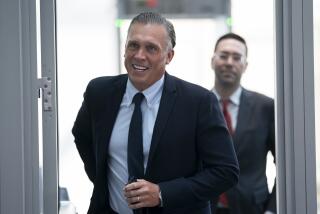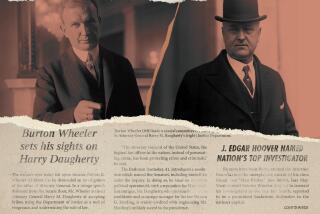Resist Revenge
- Share via
The Bush administration faces the possibility of a full-scale scandal in the Enron bankruptcy. It can be dealt with quickly or drawn out painfully. What will decide this is how fast and how thoroughly the administration comes clean on all of its ties to Enron, and whether Democrats can avoid the temptation to pay back the Republicans for their long campaign against Bill Clinton. White House forthrightness and Democratic restraint are the winning combination here.
It is now clear that Bush administration contacts with Enron were not confined to Vice President Dick Cheney’s task force; they went deep into the Cabinet. White House Press Secretary Ari Fleischer and other officials are trying to spin their way out by dismissing all questions as partisan politics, but the only way for the administration to clear itself is to open up its records, starting with the secretive energy task force.
That means minutes of meetings, phone logs, notes, e-mails, everything. Otherwise, the White House will feed the perception that it is trying to cover up involvement in a scandal that led to the collapse of one of the biggest corporate donors to the Bush campaign--the largest corporate bankruptcy in the nation’s history.
Atty. Gen. John Ashcroft, who received $25,000 from Enron CEO Kenneth L. Lay a week before being defeated in the 2000 U.S. Senate race in Missouri, has acted appropriately in recusing himself from the Justice Department’s criminal investigation. But contacts between Enron and Treasury Secretary Paul H. O’Neill and Commerce Secretary Don Evans also need to be explored fully.
The Treasury Department added Friday that Enron President Lawrence “Greg” Whalley asked Undersecretary Peter R. Fisher for help in getting banks to extend more credit and that the two men spoke six or eight times in October. If the administration did have extensive contacts with Enron and knew that the company was about to collapse, why did it do nothing to protect the employees who eventually lost their retirement savings, locked up in Enron stock? Exactly how many officials met with or had e-mail communications with Enron employees? Was the president aware of what his officials were doing?
Until recently, Rep. Henry A. Waxman (D-Los Angeles) was almost alone in demanding that the administration produce records of its contacts with Enron. He shrewdly avoided stepping from demands for information to allegations of wrongdoing. Now that five congressional committees have issued subpoenas concerning Enron, other Democrats should find strength to resist the innuendo and partisanship that marked Republican investigations of the Clinton White House.
Rumblings are also starting, though not yet on the record, among congressional Republicans who seem as alarmed as Democrats about Enron’s ties to the White House. When Congress reconvenes, perhaps supporters of campaign finance reform will whisper “Enron” in the ears of members who refuse to petition for a vote on the languishing reform bill.
Sen. Joseph I. Lieberman (D-Conn.), who heads the Senate Governmental Affairs Committee, will need to walk a line between tough questioning and needlessly heated rhetoric when he chairs the first hearing Jan. 24. The administration will do itself a favor by cooperating fully. It may well turn out that there is nothing to hide. But first the administration has to open its books on its dealings with Enron.
More to Read
Get the L.A. Times Politics newsletter
Deeply reported insights into legislation, politics and policy from Sacramento, Washington and beyond. In your inbox twice per week.
You may occasionally receive promotional content from the Los Angeles Times.










